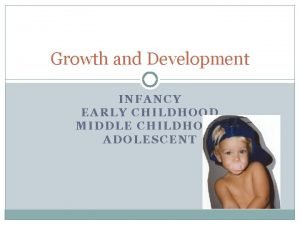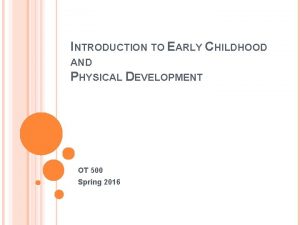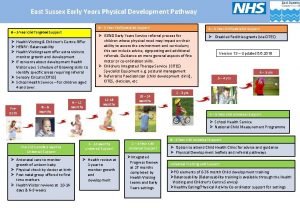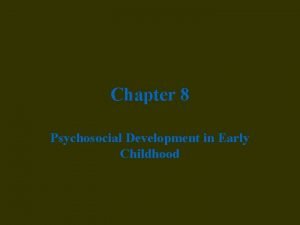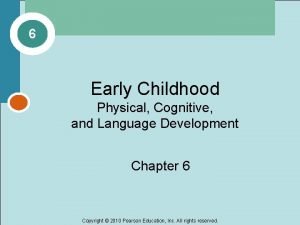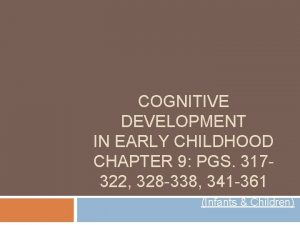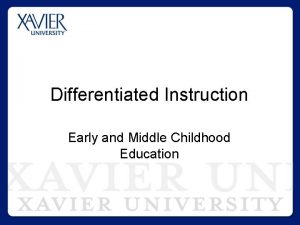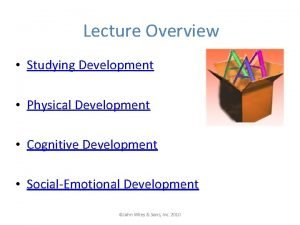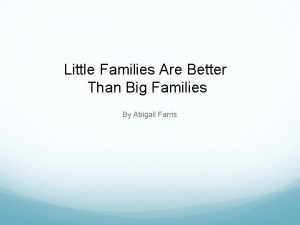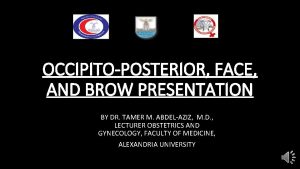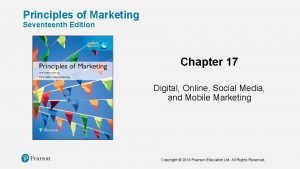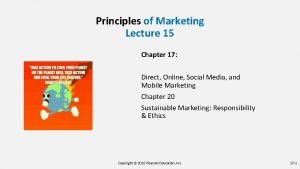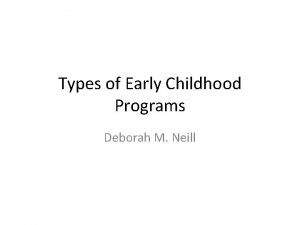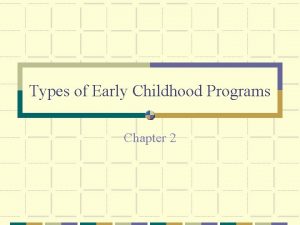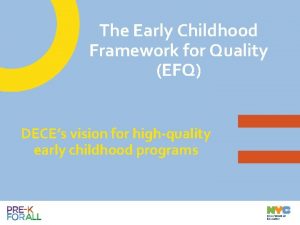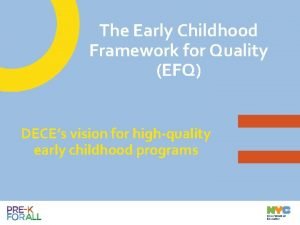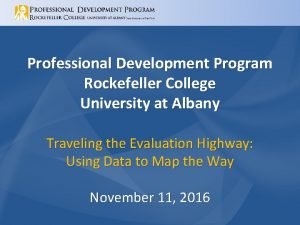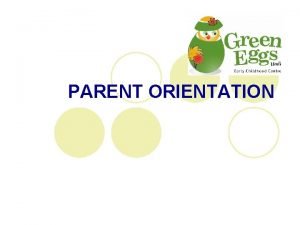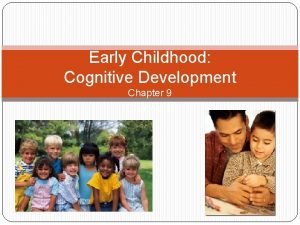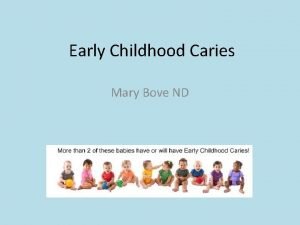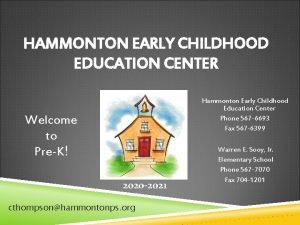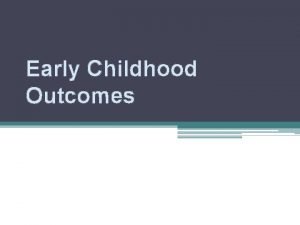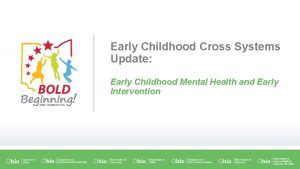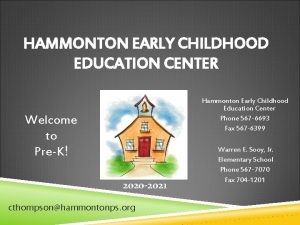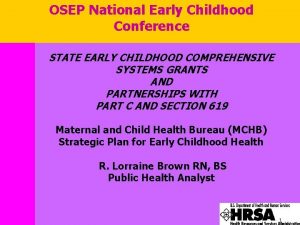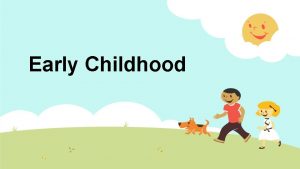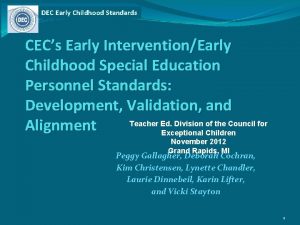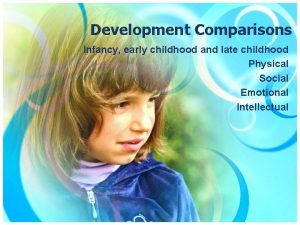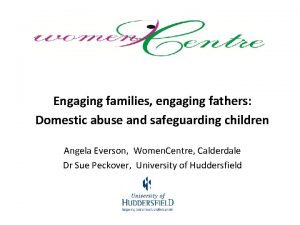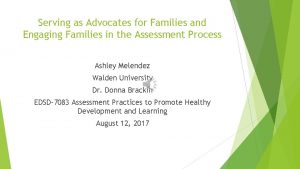ENGAGING FAMILIES IN THE EARLY CHILDHOOD DEVELOPMENT STORY



















- Slides: 19


ENGAGING FAMILIES IN THE EARLY CHILDHOOD DEVELOPMENT STORY • The Engaging Families in the ECD Story is a national project supported and funded by the Standing Council on School Education and Early Childhood (SCSEEC). • The project supports the reform priority under the National Early Childhood Development Strategy to engage parents and the community in understanding the importance of early childhood. • Stage 1 was led by the South Australian Department for Education and Child Development.

PROJECT RATIONALE • Brain development in the prenatal period and early years affects physical and mental health and learning in childhood and adult life. • The research shows that we cannot achieve our outcomes for children without an investment in families and parents. • Parents are ‘the’ strongest influences in determining their children’s life chances.

PROJECT AIMS • The aim of the project is to increase parents/carers and the community’s understanding of behaviours they can adopt during the early years of a child’s life to enhance brain development and overall life chances of children. • Stage 1 of the project identifies key messages from the neuroscience for parenting and the most effective means of providing information to parents.

STAGE 1 – PROJECT OUTCOMES • • Review of the neuroscience evidence base Review of existing parenting initiatives National parent focus groups and telephone survey Final report.

KEY MESSAGES IDENTIFIED The first five years matter and last a lifetime Good nutrition, health, and exercise are critical Children are born ready to learn The best learning happens in nurturing relationships The brain develops through use Children’s wellbeing is critical to brain development and learning Children learn through being engaged and doing Children learn from watching and copying Children’s self-control is critical for learning, responsibility and relationships • Children learn language by listening to it and using it • Children are born ready to use and learn mathematics • • •

KEY MESSAGE FROM NEUROSCIENCE PARENTING STRATEGIES EARLY YEARS LEARNING FRAMEWORK Children’s self control is critical for learning, responsibility and relationships. Regulate your own behaviour so children learn from good models. Allow young children to experience tolerable frustrations and gradually experience some supported delays in gratification. Establish purposeful routines, directions and boundaries. Play memory and association games, encourage children to make choices, such as having toys accessible to children so they can make choices and be responsible for putting them away. To help reflection (self appraisal and self monitoring), give children feedback focusing on effort rather than the success of a product. Encourage children to pretend/role play with others. Play games with children, such as ‘Simon Says’, which helps children pay attention and improves motor control and control of impulses. PRINCIPLE 1 Secure, respectful, reciprocal relationships OUTCOME 1: 2 Children develop their emerging autonomy, inter-dependence, resilience and sense of agency OUTCOME 2. 2 Children develop a sense of belonging to groups and communities and an understanding of the reciprocal rights and responsibilities necessary for active community participation OUTCOME 2. 4 Children become socially responsible and show respect for the environment Children learn self control and manage their feelings by modelling the behaviour of their parents and adults around them. The development of executive function (the ability to organise and manage your thinking, emotions and actions) including self regulation and direction is critical to early school success. This includes being able to sustain attention, try new activities with curiosity and enthusiasm, inhibit impulsive behaviour, follow directions, take turns and show concern for others. • Brain development in the prenatal period and early years affects physical and mental health and learning in childhood and adult life. • The research shows that we cannot achieve our outcomes for children without an investment in families and parents. • Parents are ‘the’ strongest influences in determining their children’s life chances.

PROJECT FINDINGS: What do parents understand about early childhood development? • Almost 1 in 5 parents thought that parents cannot make much difference to how a child’s brain develops • 25% of parents thought that television helps children’s brains more than playing and another quarter were undecided • 34% of parents thought that a one year old could understand the difference between right and wrong • 1 in 5 thought that you should only praise children when they succeeded with a task or challenge.

PROJECT FINDINGS: Accessibility of parenting programs • 126 parenting initiatives – 98 different messages • Over half of the parenting initiatives were delivered face to face • Most initiatives were delivered when convenient for services rather than parents and families • 70% of initiatives were targeting parents who met specific requirements.

PROJECT FINDINGS: In general, how useful do parents find the information they receive? • Friends and other parents were one of the most used and least criticised sources of useful information • Four of the significant general issues raised related to usefulness of information were: – the fall off of information as children grew – the lack of information about learning – the biased focus on mums – inconsistency between sources of information.

Sources of ECD information

CONCLUSION – Stage 1 We need to shift from the current emphasis on targeting different messages to a few population groups and move to a positive, consistent universal message that is accessible by all parents. A range of communication channels, tailored to meet the preferences of groups in the community but the messages stay the same.

ENGAGING FAMILIES – Stage 2 South Australia is leading stage 2 that includes the following: • Building an Alliance of interested organisations/corporations to develop a long term, sustainable social marketing campaign to share the key early childhood messages with the community as identified in stage 1 of the project. • Testing strategies to engage parents, in particular, grandparents as carers, fathers and Aboriginal families. • Progressing recommendations 1 a to 1 d identified in stage 1 of the project, particularly with regard to the development of an ECD Parenting Toolkit.

ENGAGING FAMILIES – Stage 2 National Steering Group with representatives from: – Early Childhood Development Working Group (ECDWG) – Australian Health Ministers Advisory Council (AHMAC) – Community and Disability Services Ministers Advisory Council (CDSMAC) – Child Health and Wellbeing Subcommittee (CHWS)

ECD PARENTING TOOLKIT • The aim of the Toolkit is to provide a consistent, evidence based approach to the design, delivery and evaluation of parenting initiatives • Written in a language of partnership • Based on best practice that includes a section on parent engagement • An easy to use guide that will reference other existing best practice resources • Consultation with practitioners during June 2012. • Piloted before full implementation.

SOCIAL MARKETING PLAN • SA is working in partnership with the Australian Research Alliance for Children and Youth (ARACY) to develop the social marketing plan. This will include an environmental audit, beliefs diagnosis, behavioural segmentation, policy and service interventions, communications strategies and research and evaluation plan. • As part of this work there will be a focus on testing strategies to engage grandparents as carers, fathers and Aboriginal families as outlined in the project deliverables.

CORPORATE ENGAGMENT Business Engagement Strategy: • Corporate Resource Package • Stakeholder Analysis • Mechanism to hold potential funds • Website to facilitate project This will not commence until late 2012/early 2013.

ENGAGMENT & PROMOTION • Presenting at major conferences and symposiums – Ni. FTY, ARACY forum, National Symposium: Engaging parents and Families in Learning and School • National Road Show – National Steering Group, Government agencies Research Centres, Non-Government organisations and community groups • Public Information sessions - ARACY, TNS & SA • Presentations and updates to various committees and groups • Champions across Australia.

CONTACT DETAILS KATERINA ELEUTHERIOU NATIONAL PROJECT MANAGER 08 82261064 Katerina. eleutheriou 2@sa. gov. au
 Principles of growth and development
Principles of growth and development Fine motor skills development in early childhood
Fine motor skills development in early childhood Physical development in early childhood
Physical development in early childhood Psychosocial development in early childhood
Psychosocial development in early childhood Language development in early childhood
Language development in early childhood Chapter 9 early childhood cognitive development
Chapter 9 early childhood cognitive development Biosocial child development
Biosocial child development Ldoe delivery recipes
Ldoe delivery recipes Three prenatal stages
Three prenatal stages Big families vs small families
Big families vs small families Types of brow presentation
Types of brow presentation Dynamisch verbinden
Dynamisch verbinden Marketing involve engaging directly with carefully targeted
Marketing involve engaging directly with carefully targeted Marketing involve engaging directly with carefully targeted
Marketing involve engaging directly with carefully targeted Three types of early childhood programs
Three types of early childhood programs Chapter 2 types of early childhood programs
Chapter 2 types of early childhood programs Efq examples of practice
Efq examples of practice Efq
Efq Professional development program, rockefeller college
Professional development program, rockefeller college How to welcome parents in orientation
How to welcome parents in orientation
